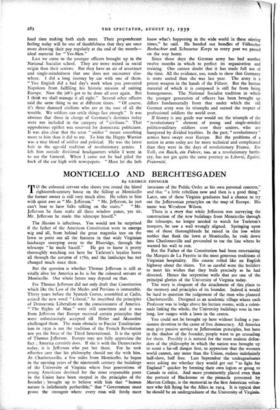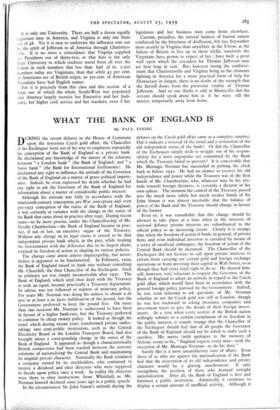MONTICELLO AND BERCHTESGADEN
By GEORGE EDINGER
1 eighteenth-century house on the hilltop at Monticello the former owner is still very much alive. He refers to him with quiet awe as " Mr. Jefferson." " Mr. Jefferson, he just can't bear to have folks talking on the stairs." " Mr. Jefferson he done make all these window panes, yes sir, Mr. Jefferson he made this telescope hisself."
The illusion is infectious. You would not be surprised if the father of the American Constitution were to emerge wig and all, from behind the great magnolia tree on the lawn to point out all the features, in that wide Virginian landscape sweeping away to the Blueridge, through the telescope " he made hisself." He got to know it pretty thoroughly watching out here for Tarleton's loyalist horse all through the autumn of 1780, and the landscape has not changed much since then.
But the question is whether Thomas Jefferson is still as vitally alive for America as he is for the coloured servant at Monticello. Our whole future may depend on that.
For Thomas Jefferson did not only draft that Constitution which like the Law of the Medes and Persians is immutable. Thirty years before the Spanish Cortes, assembled at Cadiz, coined the new word " Liberal," he inscribed the principles of Democratic Liberalism on the consciousness of America. " The Rights of Man " were still unwritten and it was from Jefferson that Europe received certain principles that were unhesitatingly accepted till Hitler and Mussolini challenged them. The main obstacle to Fascist Totalitarian- ism in 1939 is not the tradition of the French Revolution nor yet the force of the Third International. It is the spirit of Thomas Jefferson. Europe may not fully appreciate the fact ; America certainly does. If she is with the Democracies today, it is Jefferson who put her there. For he took effective care that his philosophy should not die with him. At Charlottesville, a few miles from Monticello, he began in the opening years of the nineteenth century the buildings of the University of Virginia where four generations of young Americans destined for the most responsible posts in the Union have been steeped in the principles of the founder ; brought up to believe with him that " human nature is. indefinitely perfectible," that " Government must prove the strongest where every man will freely meet 0 the coloured servant who shows you round the bland invasions of the Public Order as his own personal concern," and that " a little rebellion now and then is a good thing" Later, one of these Virginia graduates had a chance to try out the Jeffersonian principles on the map of Europe_ His name was Weodrow Wilson.
There is a story that while Jefferson was surveying the construction of the new buildings from Monticello through the telescope, no longer needed to watch for Tarleton's troopers, he saw a wall wrongly aligned. Springing upon one of those thoroughbreds he raised in the low white stables that flank the lawn at Monticello, he rode down into Charlottesville and proceeded to toe the line where he wanted his wall to run.
But the Father of the Constitution had been entertaining the Marquis de La Fayette in the most generous traditions of Virginian hospitality. His course rolled like an English highway about the shires. Yet so careful were the builders to meet his wishes that they built precisely as he had directed. Hence the serpentine walls that are one of the principal glories of the University of Virginia today.
The story is eloquent of the attachment of this place to the memory and principles of its founder. Indeed it would be hard to question the judgement of the man who planned Charlottesville. Designed as an academic village where each Professor was to lodge above his lecture rooms, with a colon- nade linking the whole, the University buildings rose in two long, low ranges with a lawn in the centre.
You could not be brought up here without feeling a pas- sionate devotion to the cause of free democracy. All America may give passive service to Jeffersonian principles, but here in the shadow of the founder, people want to go crusading for them. Possibly it is natural for the most zealous defen- ders of the philosophy in which the nation was brought up to scent a far-off danger first, to appreciate that the western world cannot, any more than the Union, endure indefinitely half-slave, half free Last September the undergraduates were asking me whether they would get out " to fight for England" quicker by forming their own legion or going, to Canada to enlist And more prominently placed even than the portrait of Blackstone or the pinnacle presented by Merton College, is the memorial to the first American volua- beer who fell flying for the Allies in 1914. It is typical that he should be an undergraduate of the University of Virginia.. It is only one University. There are half a dozen equally important ones in America, and Virginia is only one State out of 48. Yet it is easy to underrate the influence sent out by the spirit of Jefferson to all America through Charlottes- ville. It is no more a coincidence that Virginia supplied six Presidents out of thirty-two, or that hers is the only State University to which students travel from all over the Union in such numbers that less than half of its 2,500 members today are Virginians, than that while 45 per cent. of Americans are of British origin, 91 per cent. of American Presidents have had English names.
For it is precisely from this class and this section of a State out of which the whole South-West was populated that America largely recruits her Executive and her judi- ciary, her higher civil service and her teachers, even if her legislators and her business men come from elsewhere.
Custom, prejudice, the natural laziness of human nature reinforced by the bitterness of disillusion, felt last September more acutely in Virginia than anywhere in the Union, at the failure of Britain to live up to those idyllic standards the Virginians have grown to expect of her ; have built a great wall upon which the crusaders for Thomas Jefferson may yet beat long in vain. But, however strong the reinforce- ment that Charlottesville and Virginia bring to the elements fighting in America for a more practical form of help for Democracy in danger, there is no doubt of the strength that she herself draws from the persistent vitality of Thomas Jefferson. And no one thinks it odd at Monticello that the servant should speak about him as if he were ',till the master, temporarily away from home.









































 Previous page
Previous page